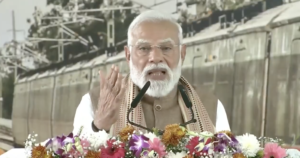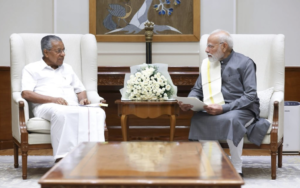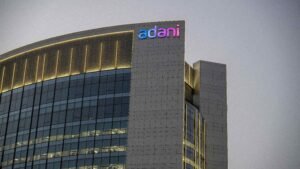New Delhi (Staff Correspondent): Durgesh Kumar Dubey, IRTS 2006 batch has served in different capacities in Railways at Bilaspur, Priyajraj, & Jhasi and he is holding the post of Deputy Chairman VPA and MD & CEO of DCIL Highlights 30-Year Journey of Infrastructure Growth and the Decisive Role of Dredging in Nation building
The Dredging India Conclave 2025, hosted by FICCI in New Delhi, convened leading voices from India’s maritime and infrastructure ecosystem to discuss the future of dredging and its pivotal role in realizing India’s maritime potential. The event was graced by Durgesh Kumar Dubey, IRTS (2006 batch), who currently serves as Deputy Chairman of Visakhapatnam Port Authority and Managing Director & CEO of Dredging Corporation of India Limited (DCIL).
In a deeply insightful keynote address, Dubey traced India’s infrastructure evolution from post-liberalization reforms to today’s ambitious maritime initiatives. Reflecting on his personal experiences in Indian Railways and national infrastructure growth, he emphasized how early initiatives like the Golden Quadrilateral and Pradhan Mantri Gram Sadak Yojana laid the groundwork for today’s robust logistics and connectivity framework.
“This small program by FICCI is a step forward for a big leap in the maritime sector. Just as roads transformed post-1991, the next 20 years will belong to India’s maritime sector, with dredging playing a critical role,” he stated.
Maritime Push and Port-led Industrialization
Dubey highlighted transformative initiatives such as the Dedicated Freight Corridor and the recently announced ₹25,000 crore Maritime Development Fund, along with the creation of Sagar Mala Development Corporation Ltd. (now an NBFC), as key enablers of growth in the sector.
He cited Visakhapatnam Port as a case study of port-led industrialization, where strategic port infrastructure catalyzed industrial growth attracting major companies like HPCL, RINL, and AMNS. “Ports like Visakhapatnam have enabled the creation of industrial hubs supported by seamless road, rail, and air connectivity—this is the power of port-led growth,” he noted.
The Expanding Role of Dredging
Highlighting the dual nature of the dredging sector—capital dredging at major ports and smaller maintenance dredging—he emphasized that both are vital for national development. As the head of DCIL, Shri Dubey reaffirmed the company’s commitment to expanding its dredger fleet, including the upcoming TSHD Godavari (12,000 m³), and looking beyond India into high-demand regions like the Middle East and Southeast Asia.
“There is a massive demand for dredging capacity, not only from new ports like Vizhinjam in Kerala or Galathea Bay in Nicobar but also from industries building their own captive ports across India,” he added.
Inland Waterways and Reservoirs: A New Frontier
Dubey drew attention to the untapped potential of inland dredging, especially for reservoirs and canals suffering from siltation, which reduces water holding and flood management capacities. With aging dams across the country, he urged fleet manufacturers and contractors to focus on developing smaller suction and cutter dredgers tailored for inland water bodies.
“This sector is growing fast. With the government’s focus on inland silt management, there’s recurring demand that can’t be ignored. Waterways are the most cost-effective and eco-friendly means of transport, and maintaining them is both a business opportunity and a national imperative,” he said.
He also mentioned upcoming government meetings with key ministries to align efforts on this front, indicating a coordinated push towards waterway and reservoir dredging.
A Call for Collaboration
Concluding his speech, Shri Dubey made an open call for partnerships and investments in India’s dredging sector. He emphasized the need for capable contractors, innovative technologies, and aligned private-public collaboration to achieve national maritime goals.
“DCI is ready to lead, but we need partners—investors, contractors, manufacturers—because without last-mile connectivity and execution support our collective efforts may fall short he concluded









